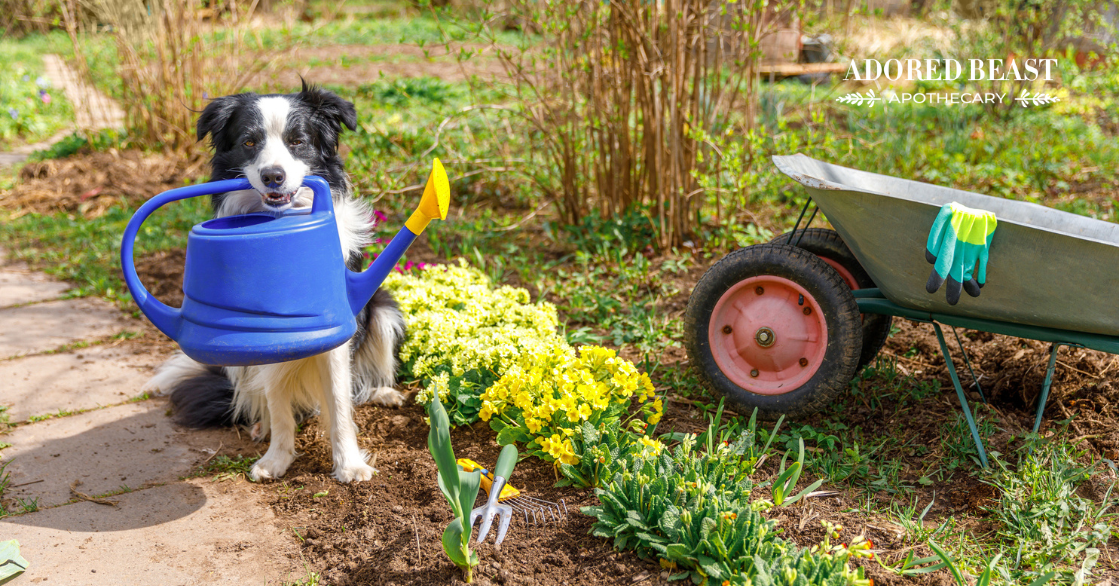Did you know that gardening is one of the most popular hobbies in North America? It’s true. More than half the population in the USA and a whopping 74% of Canadians enjoy some type of gardening at least once a month.
And people garden for a variety of reasons – to beautify their homes, to grow their own vegetables, or just to relax and reduce stress.
But whatever the reason, we need to be mindful of the fact that gardening can pose certain risks to our animals. Many commercial fertilizers contain chemicals that can be harmful or even deadly to pets if ingested. So in this post we’ll catch you up on the potential dangers, and give you some pet-safe fertilizer options to keep your garden and your pets healthy!
Why Commercial Fertilizers Can Be Dangerous
Commercial fertilizers often contain a blend of nitrogen, phosphorus, and potassium, along with other chemicals and additives. These ingredients can pose several risks to our pets:
- Toxic Chemicals: Many fertilizers include harmful chemicals such as pesticides, herbicides, and fungicides. Ingesting these substances can cause severe gastrointestinal issues, seizures, and even death in pets.
- Metals and Minerals: Some fertilizers contain heavy metals and minerals that can be toxic in high amounts. These can lead to poisoning if pets consume them.
- Mold and Fungi: Improperly stored fertilizers can develop mold and fungi, which can produce mycotoxins harmful to pets.
If you suspect your pet has ingested fertilizer, watch for symptoms such as:
- Vomiting
- Diarrhea
- Drooling
- Difficulty breathing
- Lethargy
- Seizures
In case of any of these symptoms, contact your veterinarian immediately.
Natural, Pet-Safe Fertilizer Options
So, commercial fertilizers are no-go. Are there any options that don’t pose a risk to our pets?
You bet there are! Fortunately, there are several natural and pet-safe fertilizer options that can keep your garden thriving without putting your pets at risk.
- Compost: Homemade compost is one of the best natural fertilizers. It enriches the soil with essential nutrients and improves its texture and water retention. Ensure your compost pile doesn’t contain pet-toxic materials like coffee grounds, certain fruits, and vegetables, or dairy products.
- Manure: Well-composted manure from herbivores (like cows, horses, and rabbits) is an excellent soil amendment. Make sure the manure is well-aged to reduce the risk of pathogens and strong odours. Just watch, as some dogs may snuffle around and take bites…
- Seaweed: Seaweed is a fantastic source of nutrients for plants. It contains trace minerals, growth hormones, and beneficial enzymes. Seaweed fertilizers are available in liquid or powdered form and are safe for pets.
- Eggshells: Crushed eggshells are a great source of calcium for your garden. Rinse and crush them before adding them to the soil to improve its structure and provide a slow-release calcium source.
- Banana Peels: Banana peels are rich in potassium, phosphorus, and calcium. Chop them up and bury them in the soil around your plants to boost their growth.
**Used coffee grounds are another natural option, as they add nitrogen to the soil, but only use these in areas your pets can’t get to!
[RELATED] What should you include in your pet-safe herb garden? Let’s get digging!
Other Tips for Pet-Safe Gardening
- Fencing and Barriers: Create physical barriers around your garden to keep pets from digging or ingesting plants and soil.
- Safe Storage: Store all gardening products, including natural fertilizers, out of reach of pets.
- Supervised Time Outdoors: Supervise your pets when they are in the garden to prevent them from eating soil, plants, or fertilizer.
- Pet-Friendly Plants: Choose plants that are non-toxic to pets to further reduce the risk of accidental poisoning.
- Pet-safe Pesticides: Rather than turning to chemical-based pesticides, consider the natural alternatives. There are many to choose from, including diatomaceous earth, beneficial nematodes, companion planting, and pest-repelling plants.
Creating a pet-safe garden is easy with a bit of knowledge and planning. By choosing a natural, pet-safe fertilizer and taking some precautions, you can ensure that both your garden and your furry friends remain healthy and happy. Happy gardening!












